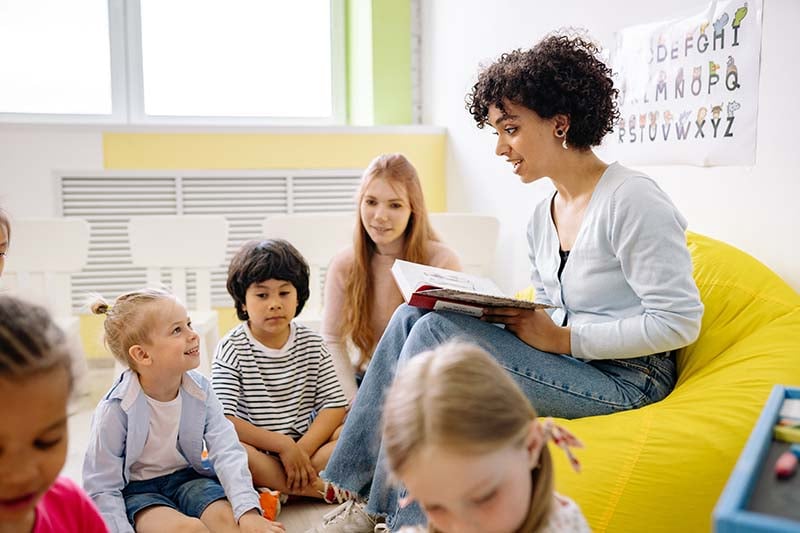 What do kids learn in 3rd grade? A 3rd grader learns to build upon foundational math and reading skills, applying them to more complex problems and concepts. Reading becomes a major focus, shifting from "learning to read" to "reading to learn," where students develop stronger comprehension skills. Vocabulary and fluency expand as children engage with more challenging texts. In math, they progress beyond basic calculations to solving multi-step problems, enhancing their critical thinking and problem-solving abilities.
What do kids learn in 3rd grade? A 3rd grader learns to build upon foundational math and reading skills, applying them to more complex problems and concepts. Reading becomes a major focus, shifting from "learning to read" to "reading to learn," where students develop stronger comprehension skills. Vocabulary and fluency expand as children engage with more challenging texts. In math, they progress beyond basic calculations to solving multi-step problems, enhancing their critical thinking and problem-solving abilities.
Tips for 3rd Grade Students
- Reading & Comprehension - Gather information, read various text styles, analyze story elements, and discuss ideas with classmates.
- Writing Skills - Edit and revise writing, structure stories with a beginning, middle, and end, and use proper punctuation.
- Math Skills - Work with larger numbers, solve word problems, understand place value, measure objects, and manage money.
- Social Studies - Learn about communities, map skills, historical figures, and cultural traditions.
- Science Skills - Understand the food chain, states of matter, recycling, and the solar system.
- Social Skills - Work independently, participate in groups, follow directions, and communicate effectively.
What Does a 3rd Grader Need to Know?
What does a 3rd grader need to know? Before entering third grade, students should have a strong foundation in reading, writing, math, social studies, and science. They should be able to read and understand different texts, structure their writing clearly, solve basic word problems, and recognize key historical and scientific concepts. Below is a checklist of essential skills third graders should master before starting the school year.
Reading and Reading Comprehension Skills
- How to collect information about a topic
- How to read different styles of text (articles, short stories, short chapters in a book)
- Ask appropriate questions and answer questions about a text (who, what, where, when, why, and how)
- Read fables, folktales, and myths
- Recall and retell events from a story in order
- Tell how the author uses details to support their story or text
- Compare and contrast elements in different stories (characters, settings, plot, and problems)
- Discuss a story or topic with their classmates (ask and respond to questions)
- Read grade-level assigned books
- Know editing and revising skills
- Write about an event using a beginning, middle, and end.
- Write something that tells a story, provides information, or gives their opinion
- Know proper punctuation
- Add and subtract number up to 100 (30+25 or 72-12)
- Solve one-two step word problems
- Understand the ones, tens, and hundreds' place in a three-digit number
- Read and write up to 1000
- Measure objects in various forms of measurements (inches, feet, centimeters, and meters)
- Understand and know the value of money
- Solve problems using money
- Know that smaller coins can equal an amount of a different coin or bill (ex: two nickels = one dime or four quarters = one dollar)
- Graph data on a bar graph
- Divide simple shapes into smaller pieces (halves, thirds, quarters)
Social Studies Skills
- Know about their community
- Basic map skills
- Locate bodies of water on a map
- Recognize more major landforms
- Recognize and know more historical buildings
- Recognize and know more important figures in history
- Know more basic cultures and their traditions (Native Americans)
Science Skills
- Know living systems like the food chain
- Recognize and know that the same materials can exist in different areas (solid, gas, liquid)
- Understand the concept and importance of recycling
- Understand the planets and know their order in the Solar System
- Use other tools to gather scientific information for an experiment
- Classify animals based on species (mammals, amphibians)
Social Skills and Abilities
- Work independently
- Interact with peers and explore concepts
- Work in a group
- Follow directions and participate in group activities
- Share and communicate appropriately with other students
- Respect their peers
- Sit for a longer period of time than in second grade (60 minutes)
What Do Third Graders Like?
What do third graders like? Third graders enjoy reading different types of stories, including fables, folktales, and myths, as they help them understand storytelling and character development. They also like discussing stories with classmates, asking and answering questions about what they read. In math, they enjoy working with money, solving word problems, and graphing data to see real-world applications of numbers. Hands-on science activities, such as classifying animals, exploring the food chain, and learning about the planets, keep them engaged. In social studies, they like learning about maps, landforms, historical buildings, and cultural traditions. Additionally, third graders enjoy working independently and in groups, participating in discussions, and exploring new concepts through interactive learning.
What Should a 3rd Grader Know by the End of the Year?
What should a 3rd grader know by the end of the year? By the time third grade ends, students should be able to read and understand different text styles, recall and retell stories, and analyze key story elements like characters, settings, and plots. Their writing skills should include structuring a story with a clear beginning, middle, and end, as well as editing and using proper punctuation. In math, they should confidently solve one- to two-step word problems, understand place value up to the hundreds place, work with money and measurements, and begin dividing shapes into smaller parts. Social studies knowledge should include basic map skills, major landforms, historical buildings, and early cultural traditions. In science, they should recognize the food chain, states of matter, the importance of recycling, and the planets in the solar system. Additionally, social skills such as working independently, following directions, participating in group activities, and communicating effectively are essential for success in fourth grade.
Genie Academy offers a range of after-school educational activities for students, encompassing areas such as mathematics, reading, writing, and coding. Offered at tutoring centers throughout New Jersey, these programs are specifically crafted for students from Pre-Kindergarten to 8th grade. Learn more about our tutoring programs in East Brunswick, tutoring programs in Hillsborough, tutoring programs in South Brunswick, tutoring programs in Marlboro, tutoring programs in Plainsboro, and tutoring programs in South Plainfield.
Explore the math genie virtual abacus at Genie Academy to enhance your math skills with a hands-on, interactive learning tool designed for all ages. Start practicing today by visiting our digital abacus and take your mental arithmetic to the next level!
Read the Rest of the Series!
Have multiple children in multiple grades? Read the rest of the series!
- 21 Things Your Child Should Know Before Entering Kindergarten
- 45 Things Your Child Should Know Before Entering First Grade
- 45 Things Your Child Should Know Before Entering Second Grade
- 43 Things Your Child Should Know Before Entering Third Grade
- 48 Things Your Child Should Know Before Entering Fourth Grade
- 49 Things Your Child Should Know Before Entering Fifth Grade
Sources:
- Morin, Amanda. "Academic Skills Your Child Needs for Third Grade." understood.org. Web. 30 Aug. 2017
- "Model Curriculum Grade 3 Mathematics Units," New Jersey State Government, https://www.state.nj.us/education/modelcurriculum/math/3.pdf
- "Model Curriculum Grade 3 ELA Units," New Jersey State Government, http://www.state.nj.us/education/modelcurriculum/ela/3.pdf
Free Gift: The Parents' Guide to 3rd Grade!
We wrote a guide answering the most common questions we've gotten from 100s of of parents of third graders. Download it for free today!





